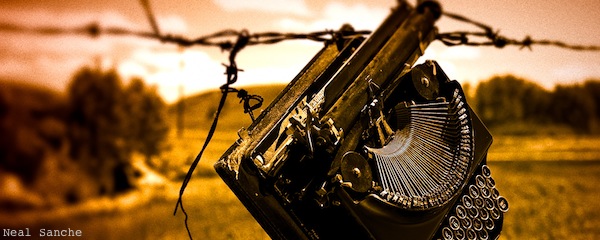
photo by Neal Sanche
by Hannah Radcliffe
All creative writing is an intrinsically personal journey. There is no hard and fast formula for getting words out of your head and onto the page, no rule book to help transform the sparks in your mind into coherent sentences and paragraphs. Every writer works in a different way, and crafts their thoughts into stories at their own pace. But what happens when you don’t have those moments of inspiration? What happens when the blank page in front of you is a desolate wasteland of half-formed ideas?
Thresholds marked National Short Story Week by asking our Twitter followers and Facebook friends to give us their best writing tips, the sure-fire corkers that never fail to get the creative juices flowing. The results were as varied as the writers who recommended them, and they made for some interesting reading for the Thresholds team.
There was quite a lot of emphasis on time – making space for your writing, and taking the time to let your ideas develop:
‘Rise early. Shower and sit fireside.
Think over the story with black coffee.
A wee ponder. Then activate laptop and conquer.’
~ Michael Crossan @michaelcrossan
‘Write a minimum every day
– time or words, whichever suits.’
~ Anna Sayburn @bloomsburyblue
‘I write in between chores. Washing up. Write a bit.
Hoovering. Write a bit. Ironing. Write a bit.
Of course, I’m thinking about what to write next
while doing the chores.’
~ Dan Powell @danpowfiction
There were, of course, some conflicting viewpoints…
‘Don’t do any housework.’
~ Erinna Mettler
There were those of you who recommended that the best occupation, when looking for inspiration, was to try doing something different from writing altogether.
‘Swimming helps me to plot.
Then I find it easier to start writing a new story
if there’s something already in my head.’
~ Tracey Fells @theliterarypig
‘Allow yourself a free day, walk, dance but don’t write.
Next day write 50 words only, following day go for it.’
~ Raine Geoghegan @rainegeoghegan5
‘A good walk can centre thought processes
more than staring at a loaded page.’
~ Jane Roberts @JaneEHRoberts
‘Go to a gallery or look at art online
– or to a museum – just triggers new thoughts.’
~ Grace Paretree @GraceParetree
Every writer will have experienced a period of time when it feels like the simple act of crafting a sentence is like wading through treacle. It’s helpful, then, that some people’s writing tips focused on the words themselves:
‘Write the last sentence first.
Then find a way to get there.’
~ Eamonn Griffin @eamonngriffin
‘Pretend it doesn’t matter;
pretend you’re goofing off. Play.
Nobody sees previous drafts.’
~ Lois Spangler @incongnitously
‘Accept someone’s permission to write rubbish.
There’s brilliance buried in it, always.’
~ Rebecca @redstar240
‘Make every word, every comma, count.
And read it again and again until it hurts.’
~ MW Bewick @MWBewick
‘Cut every single word the story can live without.’
~ Isabel Costello @isabelcostello
Each one of the writing tips offered up over National Short Story Week was a little slice of brilliance, with its own merit. I certainly went away and applied a few to my own writing process. Whether you choose to try them out or, indeed, already have your own secret formulas for finding those precious jumping-off points, I think we can probably all relate to Emily Bullock’s (@emilybwriting) gem of a suggestion:
‘To get writing… Step one: Turn off the internet.
Step two: TURN OFF THE INTERNET.’


One thought on “Your Tips for Writing Stories”
Comments are closed.